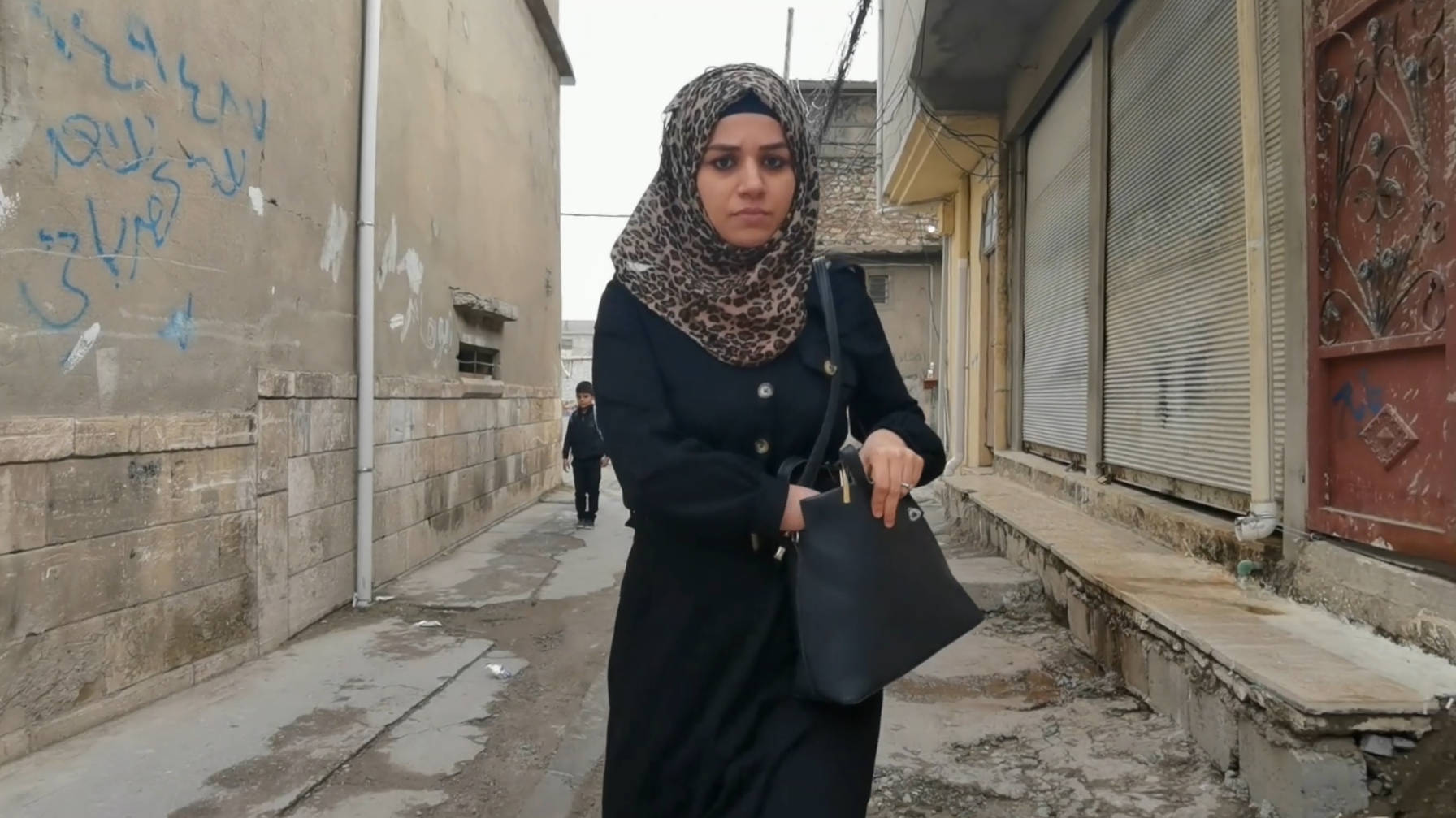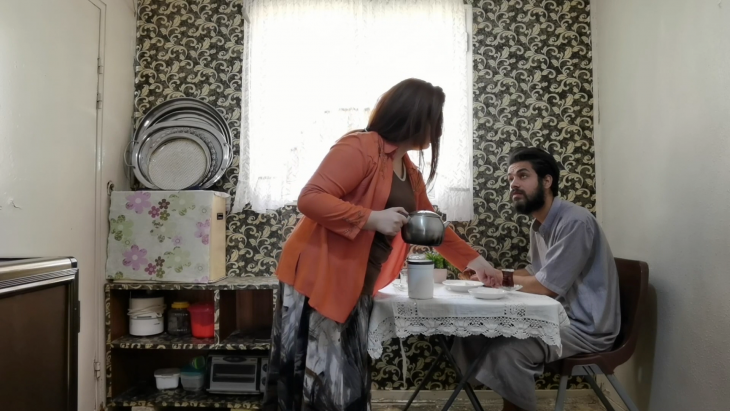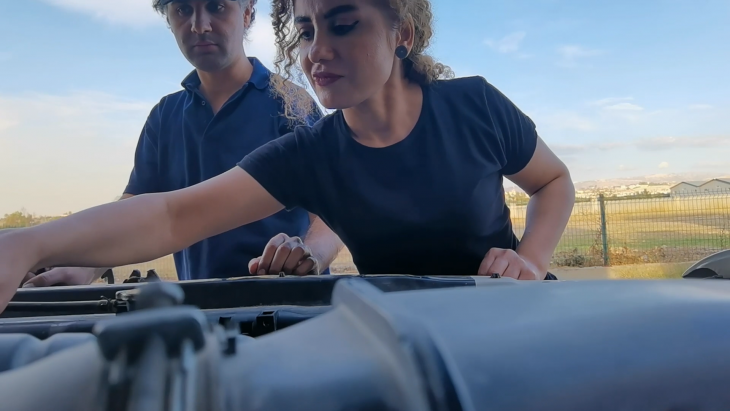The power of stories and moving images

A taxi driver glances disparagingly in the rear-view mirror at the boy and his mother in the back seat. The boy's naïve questions not only reveal what has happened, but are also incredibly painful. "Mama, why do people say that papa is with IS?" "Mama, why did the principal throw us out of the school?" "Mama, are we going to go to school again tomorrow? – No."
The taxi jolts along the streets of Mosul, the biggest city in northern Iraq. From 2014 to 2017, Mosul was in the hands of IS. As soon as the mother and son get out of the car and walk towards their home, they are surrounded by a crowd of children screaming "Daesh, Daesh, Daesh!" (Daesh being the Arabic acronym for IS). The mother resolves the problem by handing out sweets to everybody.
"Daesh in Mosul wasn't just a bad dream," says Dahlia Qutaiba, who herself comes from the city. She produced the short film Identity Limits together with Hajir Azhar. "Living under the control of IS was our reality and it is part of our experience. Confronting this only makes us stronger."
Qutaiba and Azhar participated in Women Make Film along with 14 other women. It functioned as a training programme for Iraqi women creative artists and resulted in the production of four short films. Many of the women, including Dahlia Qutaiba, had little or no previous experience with filmmaking. Qutaiba regarded herself much more as an author. As a member of a Mosul reading circle, she is also well acquainted with the author Rola Buraq, who was recently on a reading tour in Germany as part of the Inana project.

The long shadow cast by Islamic State
Iraqis are still processing the period of IS rule, and their recollections of events will ferment for some time to come. This period will also leave its mark on subsequent generations in a country already so abundantly rich in history and stories. "In Iraq, there are thousands of stories on the shelf that have never been told," relates the Baghdad filmmaker Nour Ali. One of these stories features in her film Waiting, which she shot together with Kawthar Jbara, Mariam Alzayidi and Teeba Adel. The story takes place during the Iran–Iraq war in the 1980s. "Thousands of people lost their lives in this war, but because it took place under the dictatorship of Saddam Hussein at a time in which there was no free media and, of course, no social networks, a great deal of what happened remains in the dark," says Ali.
Her film depicts the bleak speechlessness of a family torn apart when the father is called up. The family is devastated a second time when it becomes apparent what captivity as a prisoner of war has done to him. He is left a depressive, overbearing man, who seeks refuge in religion. In his broken state, he cannot bear to see his wife's fondness for fancy shoes or his teenage daughter's passion for drawing. In the end, his wife, self-determined and strong, leaves him, yet is filled with sorrow. She keeps a picture of her husband taken in better times.
Women Make Film is a project of the organisation elbarlament and, according to project manager Kenza Rady, things turned out very differently to what was originally envisaged. Due to the Covid-19 pandemic, the five workshops planned in Iraq had to take place online. For the workshop trainer, the Cairo director Salma El Tarzi, this proved to be a massive adjustment. Even the grand finale in Baghdad ultimately had to go online. The fact that they were able to find a local production company – also, incidentally, founded by a woman – was a sheer stroke of luck, says Rady.
Despite their lack of previous filmmaking experience, both Dahlia Qutaiba and Nour Ali stress how much they were changed by this project. It is no wonder then, when asked if art and culture can change their country, they answer with an unhesitating "yes". "Film-making is a creative process," explains Ali. Qutaiba emphasises, above all, the power of a good narrative. "People believe in stories. We tell ourselves stories of how individuals have overcome difficulties, how they have learned and grown from tragedies. Literature and film can convey this."

"It will take decades until we have democracy"
None of the women taking part in the Women Make Film project doubt that Iraq has to change. Many of them are active in the revolutionary movement that has left its mark on the country for over a year and that has its epicentre at Tahrir Square in Baghdad. The movement has been under pressure for months: militias have attacked its camp in Baghdad and have kidnapped or killed people they consider to have been part of the protest movement. "Change only happens little by little," says Nour Ali. "It will take decades until we have democracy in any real sense of the word. Until then, I simply hope that we can get rid of the corrupt political parties and their extremist militias."
But there is another revolution taking place in the hearts and minds of Iraqis. Old role models for men and women are slowly being replaced, and the driving force behind this is, of course, women. Twenty years ago, on 31 October 2000, UN Resolution 1325 was passed. In the UN Resolution on Women, Peace, and Security, member states were called upon for the first time to respect the rights of women. The anniversary went virtually unnoticed in Germany; not so in Iraq.
But the resolution went far beyond the straightforward demand for more protection for women. It also grants women an active role in preventing and resolving any future conflicts. "Because of the great significance of this UN resolution, we actively focused on these issues in our programme," says project manager Kenza Rady. "In addition, we had a meeting on gender matters with one of our activists from Erbil."
A wonderful example of the treatment of gender roles can be found in the short film Picnic by Zozan Saeed, Zahra Alkindy, Tuqa Al-Din, Seivan M. Salim and Kashen Waisy. It depicts a married couple in a prosperous area of Iraq arguing over typical clichéd topics. "You just go and get the stuffed vine leaves ready for the picnic in the park and I will take care of the car." But the car won't start and it turns out that the woman next door knows more about the way a car works than the husband. The traditional gender roles suffer their first blow – in the husband's case at any rate. His wife knew all along that "everything men can do, women can do as well. The only difference is that women can do things a bit better."
Change is certainly on the way in Iraq.
Christopher Resch
© Qantara.de 2020
Translated from the German by John Bergeron
